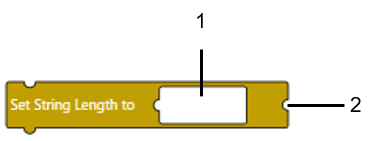Get String Length
Gets the number of characters of the string in [Source Data] and stores the value to [Destination Data].
Block

Text
TARGET = length(EXPRESSION);
1 2
| # | Description |
| 1 | [Destination Data]
Set the destination where you want to store the length of the string. The length of the string is stored as an integer value. |
| 2 | [Source Data]
Set the source data where the string is stored. If using an external variable, the string is encoded in the [String Encode] setting in the associated equipment. Otherwise, the string is encoded in UTF-8. |
(Example)
Block

Text
Var1 = length(Var3);
Operation Example
Variable in [Source Data] |
Variable in [Destination Data] |
Comments | ||
| String | Maximum Number of Bytes |
Data Type | Obtained number of characters | |
| ABCDE | 5 |
INT | 5 | - |
| AB | 5 |
INT | 2 | - |
| Aあ | 5 |
INT | 2 | The number of characters of the string is stored. |
| AA | [Variable Length] enabled in the Variable property window |
INT | 2 | - |
| Aあ | [Variable Length] enabled in the Variable property window |
INT | 2 | The number of characters of the string is stored. |
| A(0x00)CDE | 5 |
INT | 1 |
If there is a NULL (0x00), the string is terminated there.
|
| (0x00) | 5 |
INT | 0 |
If there is a NULL (0x00), the string is terminated there.
|
| A(0x0A)CD | 5 |
INT | 4 | Line feed code (0x0A) is regarded as a character. |
| A(0x0D)CD | 5 |
INT | 4 | Return code (0x0D) is regarded as a character. |